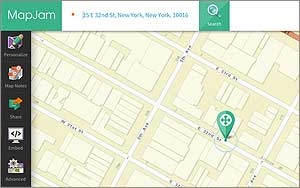
Explorers relied on maps of the stars to
guide them across long ocean voyages. Now, marketers and retailers are using mapping technologies to guide consumers to their products.
Today, MapJam, a San Francisco-based map publishing company,
announced a partnership with Weebly, a web-hosting service, that will allow Weebly users to create and personalize maps for their marketing needs.
Weebly claims to host more than 20 million
Web sites, and offers technology tools for business owners that include social media management, SEO optimization and international shipping capabilities.
With the addition of MapJam, Weebly
users can now create branded maps that are uniquely customized.
“Consumers rely heavily on maps to provide precise location when searching for a particular business,” states MapJam
co-founder Jack Gonzalez. “Because of this, it’s now extremely important for website owners, designers, bloggers and online businesses to create ‘owned’ maps.”
advertisement
advertisement
By
designing the map themselves, users can literally erase the competition of the map and only highlight their own business. They can also delete negative third-party reviews that might result from using
other mapping APIs, such as Google Maps.
MapJam has an easy-to-use drag and drop gesture, meaning no programming or coding skills are required. Maps can be customized with images, text,
logos, or video content, and then shared on a site, through social media, or in an email.
Location-based targeting and geomarketing is an intelligent marketing tool that gives marketers new
ways to identify new customers, offer targeted solutions, and increase the ROI of email marketing by personalizing and segmenting customer communication.
78% of marketers are already using
location targeting in their marketing plans, according to a July 2015 report by xAd. The top three ways marketers use it is to target a specific audience, to target consumers around points of
interest, and to send location-relevant messages, according to the report.
Geomarketing and location-based ad spend is only projected to grow.
Location-based mobile tracking was one
of the top five areas where marketers wanted to increase their spending, per Salesforce’s 2015 State of Marketing Report.
The market is predicted to triple and increase to $15 billion by
2018, according to media research agency BIA/Kelsey.
Spending in 2014 was estimated at $4.9 billion.